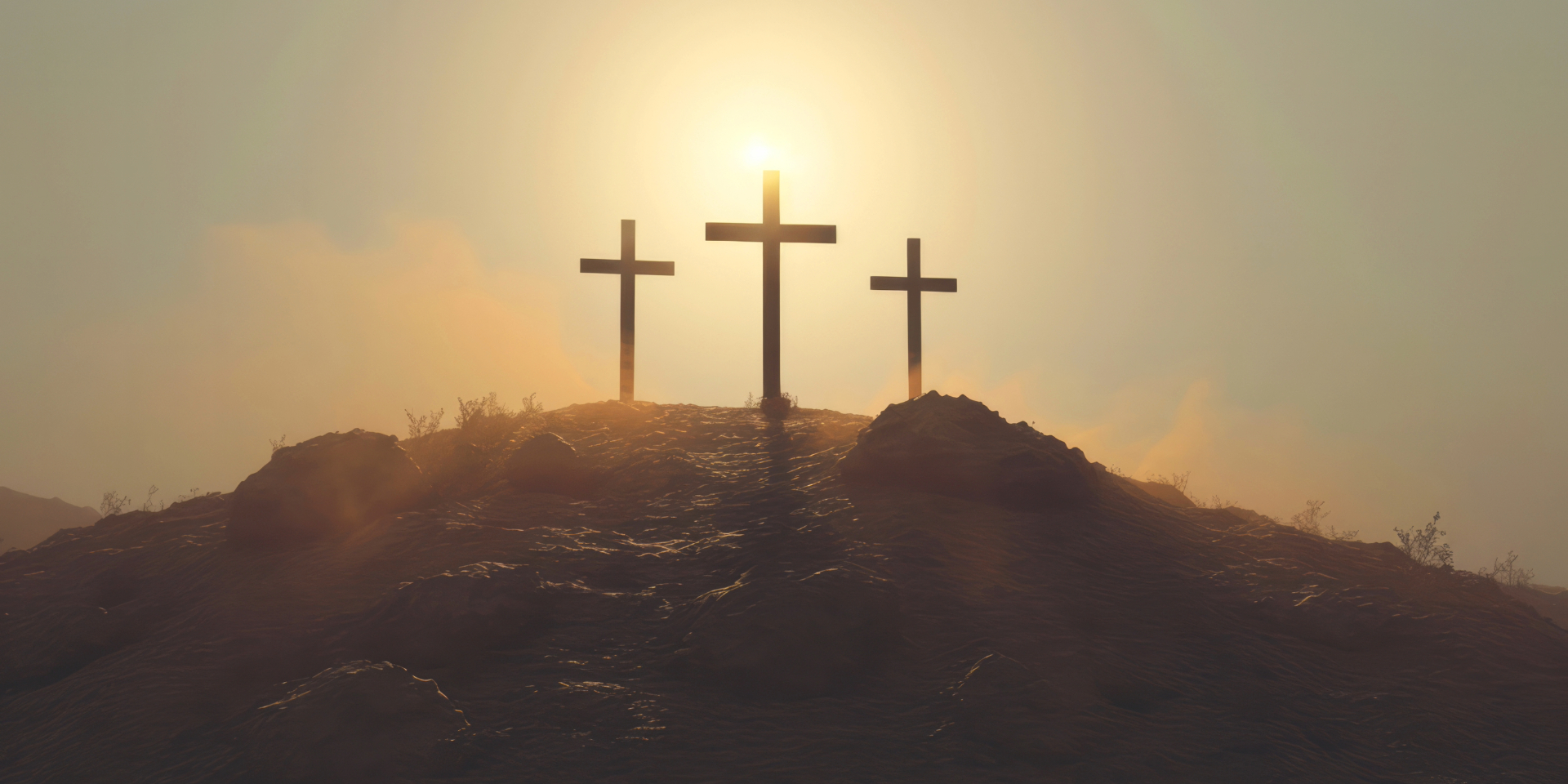For some of the witnesses to the crucifixion, the seven sayings of Jesus, spoken while He was nailed to the cross, were filled with meaning. Others downplayed or denied their significance. His words still divide people today. But the statements made by Jesus in those few hours are an important key to understanding His message.
Elementary and simple, the words derived their value not only from the moral quality of the Speaker, from His dual nature, divine-human, but also from the context and motivation of their expression. Throughout the agony of almost six hours, Jesus did not for a moment concentrate on Himself. The seven interventions of the crucified Jesus are integral to our perception of God incarnate: the divine and the human are intertwined in Christ, who is both Son of God and Son of Man.
There may well have been other words of Jesus, but we only have the evangelists’ accounts. Matthew mentions only one of Jesus’s sayings (also recounted by Mark), while Luke and John fill in the vocabulary of the cross with three examples each. Perhaps if Peter and the other apostles had not fled amid the circumstances of the arrest, the Gospels would have given a more detailed picture of the last moments of Christ’s life.
The intercessory prayer
“Jesus said, ‘Father, forgive them, for they do not know what they are doing.'” (Luke 23:34).
These words are recorded only by the Evangelist Luke. On Friday, around 9am, after the procession had reached Golgotha, the ordeal began. While the Roman soldiers nailed His limbs to the cross, Christ interceded for them (also) before His Father. His attitude is striking. Jesus is completely free of resentment, even in the cruel presence of those who were about to put His body to death. He prayed for their forgiveness before they realised they were wrong. Commenting on the response of Jesus, theologian Gerhard Maier says that the culminating example of brutality met the culminating example of love.
Jesus opened up a new way of dying. The executioners were routinised, of course. But Jesus dies originally, atypically, without His torturers realising the spiritual dimension of what was unfolding before them. There has been debate about the beneficiaries of this prayer of Jesus. Were they the Romans or the Jews? Primarily these words were addressed to the Roman soldiers, but they could just as easily have been addressed to the group of disciples, especially Peter, who had already betrayed him three times. In fact, the whole Jewish nation needed this prayer: the Pharisees, the scribes, the chief priests. Even the fickle crowd that had applauded Him a few days before could have identified with this prayer. Present or absent, everyone was involved in some way, and no one could escape their responsibility.
In a certain sense, the words spoken by Christ on the cross conclude and enrich the circle of His teachings. Everything comes together in a unified, indissoluble system. Jesus is the Logos and lives the Logos. The consistency between what He preached during His ministry and His behaviour in the face of imminent death is inspiring. His intercession for the ignorant or malicious people who had nailed Him to the cross is consistent with His teaching: “Love your enemies and pray for those who persecute you” (Matthew 5:44). Dietrich Bonhoeffer, a victim of Nazi persecution, said that by praying for them, we do for them what they do not know how to do for themselves. Of course, the prayer of the Redeemer of humanity could not have had an effect that was only local and limited in time. The plea for forgiveness addressed to the Father for those who crucified Him included the whole of humanity, which is often guilty of re-enacting His crucifixion through malicious acts.
The most wonderful promise
“Jesus replied: ‘Truly I say to you, today you will be with me in paradise'” (Luke 23:43).
Again it is Luke who records this promise of Jesus. Although in agony, with His body hanging on the cross, the Son of Man surprises us with His kindness to a common thief. His attitude shows that even in His most difficult hour, He took pleasure in listening to what was in people’s hearts—a moment when only the soul could matter. The thief showed greater faith than the disciple Thomas, who had been with Jesus for three-and-a-half years and still doubted. Luke paints a picture of true and profound spiritual counselling: a sinner dies next to the Son of God, dies with Him, and He accompanies him in death, promising him the resurrection from the dead, made possible by the sacrifice yet to be made. This is why Jesus came to earth: to seek the lost. Even as He took away the sins of the world, He was already making an impact, guaranteeing salvation to a thief desperate to find peace and forgiveness.
There is some disagreement about the meaning of this promise of Jesus. According to some translations, Jesus’s statement sounded like this: “Truly I tell you, today you will be with me in paradise.” The thief did not go to Heaven with Christ that Friday, for on Resurrection Sunday Jesus Himself said to Mary Magdalene, “Do not hold on to me, for I have not yet ascended to the Father” (John 20:17). The focus of Jesus’s promise to the thief is not “in heaven” or “today,” but in the phrase “with me.” The repentant thief treasured the words of Jesus, and his attitude reveals the essence of the Christian life. The pietist Johann Albrecht Bengel (1687-1752) said that it would be wickedness to trifle with this grace.
The love of a mother, the love of a son
“When Jesus saw His mother and the disciple whom He loved standing beside her, He said to His mother: ‘Woman, here is your son!’ Then He said to the disciple, ‘Here is your mother!’ And from that time on, the disciple took her into his house” (John 19:26-27).
Mary’s presence marked both the beginning and the end of Jesus’s public mission. She was present at the wedding in Cana, where she asked Him to attend to the needs of the bride and groom, and she was present on Golgotha when His soul was pierced with the sword of death (Luke 2:35). At the time of the death of Jesus, Mary was probably already a widow and in need of help. John, the disciple whom Jesus loved (John 13:23), the only one who remained at his Master’s side during His passion, was there. Jesus gave him the responsibility of caring for His mother, and John took up the Master’s request and fulfilled it. As Jesus approached death, He was careful to establish new family ties and to delegate protective responsibilities. John found a new mother and Mary found a new son, observed the Reverend Peter Toon. Though naked and nailed to the cross, Jesus thought first of the needs of others. His own sufferings and needs did not prevent Him from noticing the needs of others. Jesus left His earthly home in good order.
“And around the ninth hour, Jesus cried out with a loud voice, ‘Eli, Eli, lema sabachthani?’ which means, ‘My God, my God, why have you forsaken me?'” (Matthew 27:46)
“The ninth hour” corresponds to three o’clock in the afternoon. The unsettling words spoken by Jesus were the fulfilment of a prophecy: “My God, my God, why have you forsaken me? Why are you so far from saving me, so far from my cries of anguish?” (Psalm 22:1). Carrying the burden of sin, Jesus experienced the only moment of separation from the Father. He trusted His Father, but He felt alone. In addition to the physical pain of the scourging, the carrying of the heavy cross, and the crucifixion, Jesus faced an infinitely greater torment: separation from His Father, as a direct consequence of taking sin upon Himself. This was the price paid for the horror of sin. The eternal bond between Father and Son was broken by human sin and, for a few moments, eternity was torn in two.
Jesus crying out to God from the darkness is the reverse of the image of His birth. When the Son of God was incarnate, the night was illuminated by the presence of angels, and when He died, the day was marked by an unnatural darkness that lasted for three hours and covered the whole land. Though shrouded in physical darkness and the obscurity of sin, the death of Jesus illuminated the future of fallen humanity with the hope of salvation from sin.
The Water of Life is thirsty
“Later, knowing that everything had now been finished, and so that Scripture would be fulfilled, Jesus said, ‘I am thirsty'” (John 19:28).
During the first hours of the crucifixion, Jesus had to endure the heat of the sun and His position on the cross made it very difficult for Him to breathe. The heat and dehydration made His thirst unbearable. As the Son of Man, bearing in His body the limitations of humanity, He felt the consuming thirst. Jesus was a man, in the flesh, and He felt the torments He endured as any other man would have felt them in His place. “I am thirsty,” He said, and the soldiers offered Him a sponge soaked in vinegar (John 19:29). Wanting to keep His mind clear, Jesus refused their offer. But the thirst Jesus confessed had a meaning that went beyond physical thirst. These words, which once again expressed the human side of His being, were imbued with the devotional spirit of a Jew accustomed to the prayers of the Psalms: “My soul thirsts for God, for the living God” (Psalm 42:2). The Saviour was thirsting for His Father.
Mission accomplished
“When he had received the drink, Jesus said, ‘It is finished’. With that, he bowed his head and gave up his spirit” (John 19:30).
The word used in Greek is tetelestai, with the following meanings: “It is done”, “It is finished”, “It is accomplished”, “It has come to pass”, “It has been paid for”, “It has run its course.” The cry, “It is finished!” is not a sigh of relief or a release from the bonds of suffering, but it is the announcement of victory, of the fulfilment of God’s plan made before the creation of the world—the plan of salvation.
This brief utterance of Jesus on the Cross suggests that He did not die in resignation, but with a triumphant exclamation on His lips, convinced that the mission entrusted to Him by His Father and motivated by His love for humanity had been accomplished. Finis coronat opus.
Final thought
“Jesus called out with a loud voice, ‘Father, into Your hands I commit my spirit’. When He had said this, He breathed his last” (Luke 23:46).
The first and last words spoken from the cross were addressed to the Father. Peter Toon observes that while the first were a prayer asking forgiveness on behalf of others, the last were a Jewish evening prayer suggesting peace. The drama of Calvary, which began with the concretisation of forgiveness, ended with the absolute victory that brings indestructible peace. His suffering was almost over. Only a few moments separated Him from death. But Jesus was sure that His sacrifice would be accepted by the Father, and He allowed death to embrace Him, knowing that He was in the Father’s hands.
Words in the form of a cross
In the seven statements on the cross, the Word, the incarnate Logos, reveals Himself in an attitude that confirms the system of values that He proclaimed throughout His life. The congruence between the Gospel proclaimed and its fulfilment in His life (and death) is more than evident.
Although the words spoken were among the simplest and most human, the witnesses saw a genesis, a rebirth of vocabulary, the words of the Word taking the form of the cross. On the one hand, the words of Jesus are vertical, forming a true axis mundi. The Saviour in agony dominates events with the power that can only come from communion with the heavenly Father. Four of the seven sayings are addressed to the Father. On the other hand, all His sayings concern His deep involvement in earthly life. The first three statements emphasised the role of forgiveness and concern for others, and the last four were expressions of the success of redeeming the world from sin.
Two millennia after the memorable words of the passion of Jesus Christ, the echo of His words pierces the existence of Christian consciences. For the reader of the Bible, it is important to understand the errors of the ignorant or the scoffers and, by discerning the true ingredients of Easter, to harness the power of the divine Logos sacrificed for us on the cross. Behold, my people, your Saviour!



















